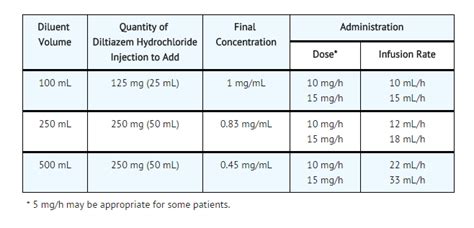Intro
Discover Diltiazem side effects, including cardiovascular, gastrointestinal, and neurological impacts. Learn about common and rare effects, interactions, and warnings to ensure safe usage of this calcium channel blocker medication.
Diltiazem is a medication that belongs to a class of drugs known as calcium channel blockers. It is primarily used to treat high blood pressure, control angina, and certain heart rhythm disorders. While diltiazem is effective in managing these conditions, it can also cause a range of side effects. Understanding these side effects is crucial for patients who are prescribed this medication, as it can help them navigate any potential issues that may arise during treatment.
The importance of being aware of diltiazem's side effects cannot be overstated. By knowing what to expect, patients can better manage their condition and minimize the risk of adverse reactions. This knowledge also empowers patients to make informed decisions about their treatment plan, in consultation with their healthcare provider. Furthermore, recognizing the signs of potential side effects can prompt patients to seek medical attention if necessary, ensuring their safety and well-being.
Diltiazem, like all medications, affects people differently. While some individuals may experience minimal side effects, others may encounter more significant issues. The severity and frequency of side effects can depend on various factors, including the dose of the medication, the duration of treatment, and the individual's overall health. It is essential for patients to closely follow their prescribed treatment plan and maintain open communication with their healthcare provider to optimize the benefits of diltiazem while minimizing its risks.
Diltiazem Side Effects Overview

Diltiazem's side effects can be categorized into common, less common, and rare effects. Common side effects are those that affect a significant portion of patients taking the medication. These can include dizziness, lightheadedness, headache, nausea, and fatigue. Less common side effects may include swelling of the feet, ankles, and hands, due to fluid retention, as well as constipation and abdominal pain. Rare but more serious side effects can involve the heart, such as worsening of heart failure in patients with pre-existing heart failure, and arrhythmias.
Common Side Effects of Diltiazem
The common side effects of diltiazem are typically mild to moderate and may diminish as the body adjusts to the medication. However, if these effects are severe or persistent, patients should consult their healthcare provider. Common side effects include: - Dizziness or lightheadedness: These symptoms can increase the risk of falls, especially in elderly patients. It is advisable to rise slowly from a sitting or lying position. - Headache: Over-the-counter pain relievers may be recommended to manage headaches, but patients should first consult their healthcare provider. - Nausea: This can sometimes lead to vomiting. Eating smaller, more frequent meals may help alleviate nausea. - Fatigue: Patients may feel weak or tired. Engaging in regular, gentle exercise and getting sufficient rest can help manage fatigue.Less Common Side Effects of Diltiazem

Less common side effects of diltiazem can affect various aspects of a patient's health, from physical comfort to psychological well-being. These include:
- Edema: Swelling of the feet, ankles, and hands due to fluid retention. Elevating the legs and avoiding excessive salt intake can help reduce swelling.
- Constipation: Increasing fiber intake, drinking plenty of water, and engaging in regular physical activity can help prevent constipation.
- Abdominal pain: This can range from mild discomfort to severe pain. Patients experiencing severe abdominal pain should seek medical attention.
Rare but Serious Side Effects
While rare, some side effects of diltiazem can be serious and potentially life-threatening. These include: - Worsening of heart failure: In patients with pre-existing heart failure, diltiazem can exacerbate symptoms. Close monitoring by a healthcare provider is essential. - Arrhythmias: Abnormal heart rhythms can be a side effect of diltiazem. Patients experiencing symptoms such as palpitations, shortness of breath, or chest pain should seek immediate medical attention. - Allergic reactions: Although rare, allergic reactions to diltiazem can occur. Symptoms may include rash, itching, swelling, severe dizziness, and trouble breathing. An allergic reaction is a medical emergency.Managing Diltiazem Side Effects

Effective management of diltiazem's side effects involves a combination of lifestyle adjustments, monitoring, and, in some cases, medication adjustments. Patients should:
- Stay hydrated to help prevent constipation and reduce the risk of dizziness.
- Engage in regular, gentle exercise to manage fatigue and improve overall heart health.
- Monitor their blood pressure regularly, as diltiazem can cause hypotension (low blood pressure).
- Keep all follow-up appointments with their healthcare provider to monitor the effectiveness of the medication and manage any side effects.
Lifestyle Modifications
Lifestyle modifications can play a significant role in minimizing the impact of diltiazem's side effects. These include: - Dietary changes: Avoiding excessive salt intake can help reduce fluid retention and swelling. - Physical activity: Regular exercise can help manage fatigue, improve mood, and enhance overall cardiovascular health. - Stress management: Techniques such as meditation, deep breathing, and yoga can help manage stress, which can exacerbate some side effects.Diltiazem Interactions

Diltiazem can interact with a variety of medications, potentially leading to adverse effects or reducing the efficacy of either diltiazem or the interacting medication. It is crucial for patients to inform their healthcare provider about all medications they are taking, including over-the-counter drugs, vitamins, and herbal supplements. Significant interactions can occur with:
- Beta-blockers: These medications are also used to treat high blood pressure and heart conditions. Taking them with diltiazem can increase the risk of heart problems.
- Digoxin: Used to treat heart failure and arrhythmias, digoxin levels can increase when taken with diltiazem, potentially leading to toxicity.
- Cyclosporine: This immunosuppressant can have its levels increased by diltiazem, potentially leading to increased risk of side effects.
Precautions and Warnings
Certain precautions and warnings are associated with the use of diltiazem. Patients with a history of heart failure should be cautious, as diltiazem can worsen this condition. Additionally, patients with liver or kidney disease may require dose adjustments, as these conditions can affect how the body processes diltiazem. Pregnant or breastfeeding women should consult their healthcare provider before taking diltiazem, as its safety in these situations is not well established.Diltiazem Dosage

The dosage of diltiazem varies based on the condition being treated and the formulation of the medication. It is available in immediate-release and extended-release forms, each with different dosing instructions. Patients should follow their prescribed dosing schedule closely and not adjust their dose without consulting their healthcare provider. Missing doses can lead to a return of symptoms, while taking too much diltiazem can increase the risk of side effects.
Overdose
In the event of an overdose, patients or their caregivers should seek emergency medical attention. Symptoms of an overdose can include severe dizziness, fainting, and shortness of breath. If the overdose is discovered shortly after ingestion, the healthcare provider may attempt to induce vomiting or use activated charcoal to reduce absorption.Conclusion and Next Steps

In conclusion, while diltiazem is an effective medication for managing high blood pressure, angina, and certain heart rhythm disorders, it is not without potential side effects. By understanding these side effects, patients can work closely with their healthcare providers to minimize risks and maximize benefits. Open communication about any symptoms or concerns is key to successful treatment. As with any medication, the decision to start diltiazem should be made after careful consideration of its potential effects, both positive and negative.
We invite you to share your experiences or ask questions about diltiazem in the comments below. Your input can help others better understand the implications of this medication and its potential side effects. Additionally, if you found this article informative, please consider sharing it with others who might benefit from this information.
What are the most common side effects of diltiazem?
+The most common side effects of diltiazem include dizziness, lightheadedness, headache, nausea, and fatigue. These effects are typically mild to moderate and may decrease as the body adjusts to the medication.
Can diltiazem be used in patients with heart failure?
+Diltiazem can worsen heart failure in patients with pre-existing condition. It should be used with caution and under close monitoring by a healthcare provider in such cases.
How does diltiazem interact with other medications?
+Diltiazem can interact with various medications, including beta-blockers, digoxin, and cyclosporine, potentially leading to adverse effects or reducing the efficacy of the medications. Patients should inform their healthcare provider about all medications they are taking.
